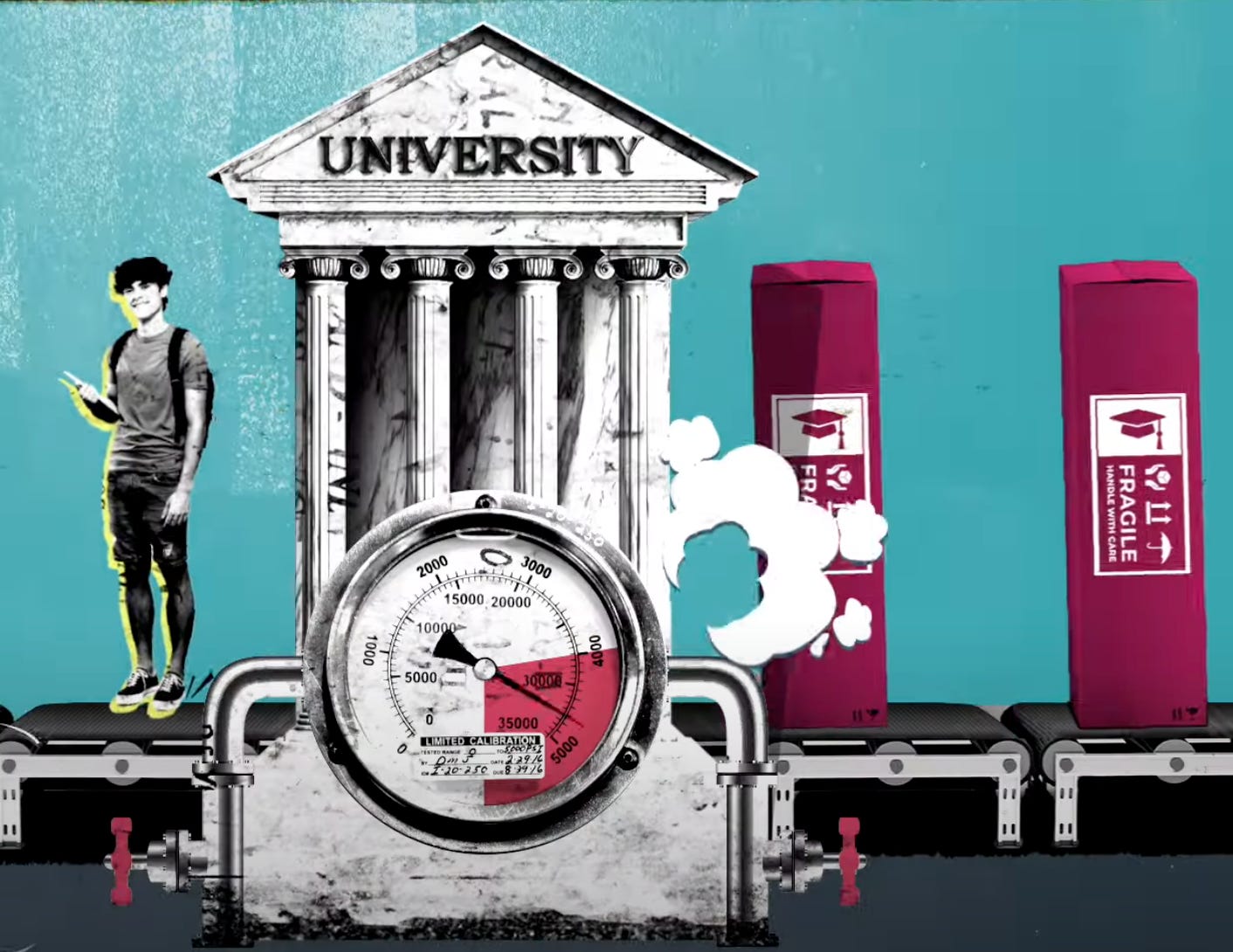Elite overproduction, managerial feminism, and the death of mobility
Elite surplus increases competition, fuels feminization of work, and kills merit
Welcome, and I’m grateful for your time spent chasing signal with me in a noisy world. I recommend catching up on the first part of this argument, in which I name feminized competition as one killer of merit.
If society produces too many people who aspire to elite status and does not have enough jobs to absorb them, what happens? We’re living through one such period, and it isn’t the first time since the Industrial Revolution. This time, however, women are the overproduced elites, which we know because women have outnumbered men 60:40 in BA attainment since the 80s.
Stemming from this structural condition, we see institutionally enforced feminism through corporate governance, DEI programs, and soft social control; women make up enough of middle management for feminized norms to rule work, as I’ve seen firsthand. Managerial feminism fuses with credentialism and class anxiety to create the political instability we’re now seeing. The expansion of the managerial state occurred in tandem with the mass entry of women into white-collar work and government.
Women have also evolved to be more concerned with morality and the enforcement of behavioral norms, leading to feminist advocacy for ideological programs in the workplace and society. These conditions make competition even more intense among women and between the sexes. It’s no accident that we’ve seen social justice ideology and status anxiety rise in tandem. Today, competition among elites happens according to rules that women make, privileging covert competition based on moral capital.
With material capital scarce, women compete for moral capital and symbolic status because they’re primarily in jobs that do not require analytical skills, which are the most remunerative.
Most writers are outsiders looking into this system, while I live inside it. I’m a technical consultant in the B2B software space, with experience in recruiting, teaching, marketing, and product management prior to this role. Most writers on these topics are academics or professional writers with little to no corporate experience, so they often miss much of what I diagnose.
Elite surpluses are cyclical and have generally led to instability. Economist Peter Turchin demonstrates a relationship between four sets of indicators in his paper, “Modeling Social Pressures Toward Political Instability.”1 Given sufficient pressure on any combination of these factors, revolutions and civil wars may result; we’re living in such a time.
Elites also act more groupish based on class status than do people across classes who are of the same ethnicity. An elite white woman has more shared quotidian experiences with a professional-class black woman than the latter does with a black working-class woman. Due to the disproportionate amount of women with degrees, the elite today have chosen feminism as their governing ideology; DEI is an outgrowth of feminist academic output. In past periods of overproduction, feminism wasn’t ascendant, and most of the elites were men.
Women’s entry to the professional world has changed its nature, whereby they now diffusely exercise power that can’t be named through structures we’ve been told are patriarchal. But as the professional class has become more feminized, it self-justifies and controls behavior covertly. Feminism is a system of class reproduction, yet it’s assumed to be a benign empowerment mechanism.
II. Credentialism, overproduction & class consolidation
Degrees serve as proxies for class membership, which means more than whether you have money. Degree-holders from families with two professional-class parents move through the world differently from those without educated parents. There are social graces and communication norms one absorbs outside of the college experience, and one must have both to succeed in corporations and fit into professional-class social groups.
Credentialism, therefore, is a moat around the elite guarding against open competition for dwindling jobs. We know that people of poor and working-class origin tend not to go to college or otherwise struggle to graduate. When starting a career, the prestige of the university becomes a shorthand for one's ability. Those without degrees altogether need not apply.
Non-elites don’t even get to enter the arena; the only reason the Google recruiter contacted me in 2013 was the elite signaling of Teach for America on my resume. I haven’t removed Google, either, because I know it’s a status signifier. While I was there, the only potential software engineers I could send through the interview process were from pools of elite degree holders, selected based on the rank of their school. I had a scant number of state or non-elite graduates in the hiring pool for men or women. As a ‘diversity recruiter’, I mainly recruited elite white and Indian-origin women. Indians who make it to the US to pursue a master’s program are already well-off in India.
III. DEI as a class gatekeeping mechanism
DEI compounds the suppression of merit because it creates incentives to hire potentially mediocre people to fill implicit quotas, as I saw firsthand as a recruiter. At the very least, they give certain groups a leg up while finding ways to hold men back or otherwise silence them. We see this happen in our workplaces, but we aren’t allowed to name it.
Separately, the push to hire more women, and women of color in particular, has led to an increase in people- and process-oriented jobs, which are now disappearing. Specifically, departments with a high proportion of women tend to be more risk-averse and slower to make decisions, leading to significant organizational paralysis. When I worked at Indeed, the marketing department was bloated, with primarily women in jobs that didn’t seem necessary. They moved tickets around or created marketing materials that required me to build technical campaigns; my team had the most significant amount of work, as they were the skilled builders. It was unclear what most others did other than sit in meetings and shuffle Google Docs.
Feminism becomes the moral armor to justify hiring women without analytical skills into bloated departments; the goal is to have more women at the table, rather than rebuilding the table to be meritocratically determined. A contest plays out under the surface that doesn’t lead to the most competent woman being elevated. Rather, women are elevated by other women based on likability and compliance with female behavioral norms. And it is women enforcing this regime, not men, like we’ve been told.
I know several women who entered technical careers like me, with or without a degree. In practice, these women have faced barriers at the first step of the process, so they don’t even get their foot in the door for an interview. Recruiters and HR professionals are overwhelmingly women, so we can assume they are shutting out other talented women based on arbitrary class signals. I’ve heard the argument that HR is just doing what the CEO wants, which fundamentally misunderstands how recruiting works and the extent to which the CEO actually controls it. Women have agency, regardless of their position within the corporation. We’ve quietly reshaped the landscape according to our behavioral and communication inclinations.
The most absurd argument I’ve heard in favor of credentialism was that ridding degree requirements would hurt women and people of color. But in practice, it would be already elite people of color who would be subject to more competition from those who independently developed skills or didn’t go to elite colleges.
IV. Making the system meritocratic
First, all jobs should require skills and communication assessments, and we shouldn’t require degrees at all. For communication- and process-oriented jobs, it’s not difficult to write a test that requires candidates to work through scenarios and explain their thinking before advancing them to an interview; this is how many interview questions are already structured. The portion to be made truly competitive is who gets the interview in the first place.
Many technical jobs already don’t require degrees because the technical functions can be assessed separately from credentials, opening these jobs to people who didn’t happen to choose the correct major. This is an equitable method to determine who passes the first gate for a job.
Second, initial hiring steps should be blind to the candidate’s identity categories. I contend that the EEOC form should be abolished because it creates perverse incentives to fulfill quotas for identity categories, despite the claim that it has no bearing on who gets the job. Until a recruiter meets the candidate, the candidate's race and gender should be masked by applicant tracking systems to prevent bias.
Third, performance assessments shouldn’t include peer reviews. A ‘360 review’ isn’t a comprehensive assessment of performance but a method of surveillance. Peer reviews punish behavioral and personality deviation; jobs that can’t be judged on outcomes shouldn’t exist.
Credentialism, feminism, and elite overproduction have produced perverse incentives to stifle excellence and prevent social mobility by status-obsessed people. There’s a caste system based on class that is rendered invisible. I’ve managed to climb despite the elites around me who have often suppressed merit-based recognition at work. This happens rather frequently to high-performing women at the hands of other women around them.
The soft control of the new aristocracy justifies exclusion through a facade of morality. Moral capital is a form of currency because real capital is scarce. It punishes dissent by stripping people of their livelihoods for deviating from ideological orthodoxy.
The professional class has no legitimate future unless it abandons moralizing in favor of merit and pragmatism. It must relinquish its ideological dogmas to earn its place. We hear thought-terminating, nihilistic clichés in our circles like “there is no ethical work under capitalism,” but this justifies mediocrity. Mastery creates systems that produce the comfort in which we live, and competition for scarce jobs must happen based on talent to be legitimate. The current system coddling entitled but mediocre elites will eventually eat itself and everyone under it.
I’m building a post-ideological structure for a life of depth. I write because I want to help others reach a post-ideological self; I’m not here to tell you what you want to hear. If you want to read that which others are usually too afraid to name, join me.









"DEI compounds the suppression of merit because it creates incentives to hire mediocre people to fill implicit quotas, as I saw firsthand as a recruiter. At minimum, they give certain groups a leg up while finding ways to hold men back or otherwise silencing them. We see this happen in our workplaces, but we aren’t allowed to name it."
That last part is important. Most elites now exist in large, hierarchical institutions. They're status-conscious and ambitious, and so they learn to subordinate their own instincts and impulses and opinions to the collective. Or rather, they learned to do this when they were in grade school.
That's a major tragedy of our time, which is rarely remarked upon: people have been trained to be cowards. In most cases this isn't apparent, but when the time comes and bravery or nonconformity or risk (of promotion, popularity, EMPLOYMENT) is warranted, people shrink from the call in almost every case. Feminization is a big part of that, I suspect, since women are more concerned about social desirability bias (and they're often creating the rules and HR policies and trainings for these organizations) but it would be inaccurate to say that man are less cowardly. EVERYONE is cowardly because it's the rational way to be. In a society which values only money and status and comfort, there's no place for courage or honor. There's also no place for analytical rigor or integrity, ultimately. The thing I wish I could tell these professionals isn't something that can be conveyed through words, unfortunately. It is: if you live with integrity and originality your life will probably be better (more interesting, more fulfilling, more WHOLE) even if your career suffers. I know that they wouldn't believe me though. The idea of having a better life and a worse career outcome is incoherent to most people. That's kind of the problem, I guess.
Working for large organizations is one thing. Giving them ownership and control of your soul is intolerable. You might wake up in a nice Upper West Side apartment with a spouse and privately educated children and a great job... and find that you're not happy. You've been pursuing the wrong things. Previous cultures understood this intuitively and encoded it into their norms and values. We've deleted all of that code.
The most dangerous class in any society are surplus elites.